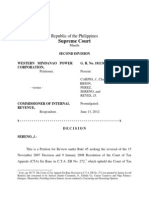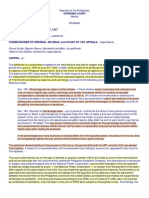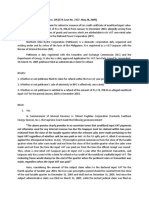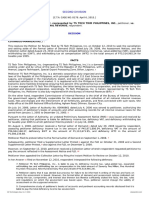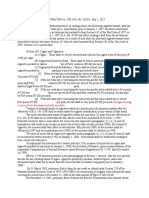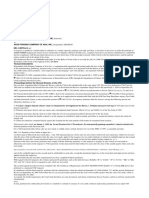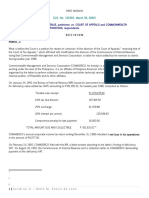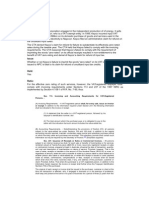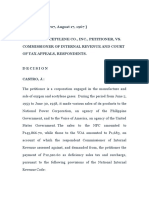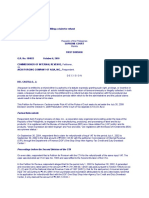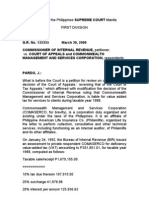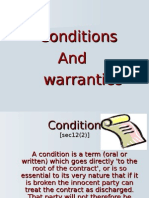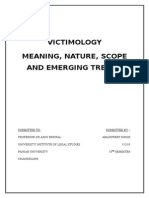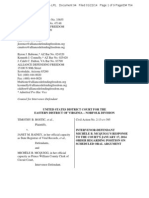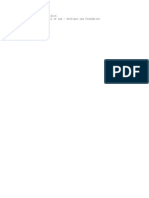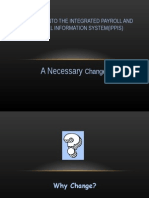0 ratings0% found this document useful (0 votes)
218 viewsPNP Multipurpose Cooperative vs. CIR
PNP Multipurpose Cooperative vs. CIR
Uploaded by
Phoebe SpaurekThis document is a decision from the Court of Tax Appeals regarding a petition filed by the Philippine National Police Multi-Purpose Cooperative, Inc. seeking a refund of PHP 75,110.88 in value-added tax (VAT) paid on purchases from October to December 1991. The Court analyzes the relevant tax laws and cooperative code provisions. It determines that as a cooperative that does not transact business with non-members, the petitioner is exempt from government taxes including VAT under the Cooperative Code. Therefore, the petitioner is entitled to a refund of the VAT paid.
Copyright:
© All Rights Reserved
Available Formats
Download as PDF, TXT or read online from Scribd
PNP Multipurpose Cooperative vs. CIR
PNP Multipurpose Cooperative vs. CIR
Uploaded by
Phoebe Spaurek0 ratings0% found this document useful (0 votes)
218 views11 pagesThis document is a decision from the Court of Tax Appeals regarding a petition filed by the Philippine National Police Multi-Purpose Cooperative, Inc. seeking a refund of PHP 75,110.88 in value-added tax (VAT) paid on purchases from October to December 1991. The Court analyzes the relevant tax laws and cooperative code provisions. It determines that as a cooperative that does not transact business with non-members, the petitioner is exempt from government taxes including VAT under the Cooperative Code. Therefore, the petitioner is entitled to a refund of the VAT paid.
Original Description:
The Case of PNP v. CIR
Taxation Law
Copyright
© © All Rights Reserved
Available Formats
PDF, TXT or read online from Scribd
Share this document
Did you find this document useful?
Is this content inappropriate?
This document is a decision from the Court of Tax Appeals regarding a petition filed by the Philippine National Police Multi-Purpose Cooperative, Inc. seeking a refund of PHP 75,110.88 in value-added tax (VAT) paid on purchases from October to December 1991. The Court analyzes the relevant tax laws and cooperative code provisions. It determines that as a cooperative that does not transact business with non-members, the petitioner is exempt from government taxes including VAT under the Cooperative Code. Therefore, the petitioner is entitled to a refund of the VAT paid.
Copyright:
© All Rights Reserved
Available Formats
Download as PDF, TXT or read online from Scribd
Download as pdf or txt
0 ratings0% found this document useful (0 votes)
218 views11 pagesPNP Multipurpose Cooperative vs. CIR
PNP Multipurpose Cooperative vs. CIR
Uploaded by
Phoebe SpaurekThis document is a decision from the Court of Tax Appeals regarding a petition filed by the Philippine National Police Multi-Purpose Cooperative, Inc. seeking a refund of PHP 75,110.88 in value-added tax (VAT) paid on purchases from October to December 1991. The Court analyzes the relevant tax laws and cooperative code provisions. It determines that as a cooperative that does not transact business with non-members, the petitioner is exempt from government taxes including VAT under the Cooperative Code. Therefore, the petitioner is entitled to a refund of the VAT paid.
Copyright:
© All Rights Reserved
Available Formats
Download as PDF, TXT or read online from Scribd
Download as pdf or txt
You are on page 1of 11
REPUBLIC OF THE PHILIPPINES
COURT OF TAX APPEALS
QUEZON CITY
PHILIPPINE NATIONAL POLICE
MULTI - PURPOSE COOPERATIVEr
INC. r
Petitioner,
- versus - C.T.A. CASE NO. 4845
JOSE U. ONGr in his capacity
as COMMISSIONER OF INTERNAL
REVENUEr
Respondent.
X - - - - - - - - - - X
DECISION
Beore this Court is petitioner's claim for reund
of value-added tax <VAT> in the amount o P75,110.88 or
purchases it had during the last quarter of 1991.
The antecedent facts o this case are as allows:
The petitioner, Philippine National Police Multi-
Purpose Cooperative, Inc. is a cooperative composed
solely o government employees organized under the
provisions o Republic Act <R.A.)No. 6938, otherwise
known as The Cooperative Code of the Philippines.
I
- During the period rom October to December 1991, the
petitioner purchased various merchandise rom dierent
suppliers. It alleged that the various suppliers included
in their sales price the ten per cent <10/.) VAT amounting
to P75,110.88 computed as allows:
l8u
DECISION -
C.T.A. CASE HO. 4845.
- 2 -
Suppliers
Goldstar Phils. Sales Corp.
Paluwagan Market i ng Inc.
, Automatic Center
Masa Marketing Corp.
CFC Corporation
Century Canning Corp.
Nestle Phils., Inc.
Marina Sales, Inc.
Conrad and Company, Inc.
Pureoods Corporation
Johnson and Johnson
Zuellig Distribut ors, Inc.
Commonwealth Foods, Inc.
Victorias Milling Corporation
Mac - Van Sales Marketing, Inc.
Caliorni a Mg. Co., Inc.
Universal Robina Corporation
Philips Food Corporation
Lamoiyan Corporation
T o t a 1
*With a dierence o P0.98
VAT Collected
11, 001.49
8,318.45
3,648.10
6,470.91
1,392.22
3,589.12
4,699.55
2,986.11
1, 471. 15
10,690.00
4,322.03
1,079.05
2, 423. 37
2,257.50
3,724.34
1,607.44
1,800.50
1,709.52
1, 921.01
P75, 111. 86*
On June 25, 9 9 2 ~ pet i tioner iled beore the
respondent, Commissioner o Internal Revenue, a written
application or reund o the amount o P75,110.88
claiming that it is not subject to any government tax
under the internal revenue laws and other tax laws
<Annex"C", C.T.A. Records, p. 11>.
Respondent, in his letter-decision dated July 28,
1992 denied the claim or reund. He explained his
decision as ollows:
"Please be inormed that under Section 99
o the National Internal Revenue Code <NIRC>,
as amended by Executive Order No. 273, the
persons liable or the VAT are not the buyers/
purchasers but the sellers/importers o goods
and those perorming services or a ee.
However, since the VAT is an indirect tax, it
DECISION -
C.T.A. CASE NO. 4845.
- 3 -
can be shifted to customers. Once shifted to
the customer as addition to the cost of
goods/services sold, it is no longer a tax but
an additional cost which the customer has to
pay in order to obtain the goods/services
<Philippine Acetylene Co. vs. Commissioner of
Internal Revenue, G.R. No. L- 19707. August 17,
1967, as cited in BIR Ruling No. 297-88 dated
July 6, 1988>. Thus, the shifting of the VAT to
you by your suppliers does not make you the
person liable thereof." <Annex "A", C.T.A.
Records, p. 9)
Petitioner filed before this Court on September 8,
1992 the instant Petition for Review of the respondent's
decision claiming that the latter erred in holding that
the petitioner is not entitled to a refund of the VAT
paid on its purchases.
Respondent, in his Answer, prays that the petition
be denied for lac k of merit arguing by way of special and
affirmative defenses that: 1) the petition has failed to
state any cause of action; 2) tax refunds are in the
nature of tax exemptions which are construed strictly
against the taxpayer; 3) in an action for refund; the
taxpayer has the burden . to show that the taxes paid were
erroneously o r illegally paid; and 4> the claim for
refund is still under investigation.
petitioner filed on January 29, 1993 its Reply and
Motion pr aying for the admission of its factual
allegati ons inc luding the genui neness and due execution
of Annexes "A" a nd "C" as they were not denied under oath
by the r espondent.
l ~
DECISION -
C.T.A. CASE NO. 4845.
- 4 -
On June 29, 1993, petitioner iled its Maniestation
and Motion that the copies o Request or Admission sent
to the respondent be noted by this Court together with
the Exhibits.
During the hearing o June 30, 1993, respondent
maniested that since the issue involved in the case is
purely legal, he "is waving the right to present
evidence." <C.T.A. Records, p. 169). Both parties were
given thirty (30) days to submit their respective
memoranda ater which this case shall be considered
submitted or decision.
Petitioner iled its Memorandum on August 16, 1993.
On the other hand, respondent did not ile a memorandum
to support his case.
There being no objection on the part o the
I
respondent with regard to the petitioner's Request or
Admission o actual issues, the only . legal issue let
or this Court's resolution is whether or not petitioner
is entitled to the reund o VAT in the amount o
P75,110.88 representing input taxes or purchases it had
or the months o October, November and December o the
taxable year 1991.
There is no question that petitioner is a
cooperative under the category stated in Article 61 o
the Cooperative Code which reads as ollows:
lbb
DECISION -
C.T.A. CASE NO. 4845.
- 5 -
"ART 61. Tax Treatment of Cooperative
Duly registered cooperatives under this Code
which do not transact any business with
nonmembers or the general public shall not be
subject to any government taxes or ees imposed
under the internal revenue laws and other tax
laws. xxx"
Sections 100(a)(2) and 103(u) o the Tax Code
provide:
"SEC. 100. Value-added tax on sale of
goods - Ca> Rate and base of tax. - There shall
be levied, assessed and collected on every
sale, barter, or exchange o goods, a value-
added tax equivalent to lOY. o the gross
selling price or gross value in money o the
goods bartered or exchanged, such tax to
be paid by the seller or transeror: Provided,
That the allowing sales by VAT-registered
persons shall be subject to OY..
XXX XXX XXX
( 2)
exemption
agreements
signatory
zero rate.
Sales to persons or entities whose
under special laws or international
to which the Philippines is a
eectively subjects such sales to
xxx"
"SEC. 103.
allowing shall
tax:
XXX
Exempt Transactions the
be exempt rom the value-added
XXX XXX
Cu> Transactions which are exempt under
special laws or international agreements to
which the Philippines is a signatory; xxx"
The VAT Implementing Regulations provide or the
distinctions between zero-rated and exempt transactions,
thus:
"SEC. 8. Zero-rating. - (a) In general.
A zero-rated sale is a taxable or
value-added tax purposes. A sale by a VAT-'
1.. : I I
J... u/
DECISION -
C.T.A. CASE NO. 4845.
- 6 -
registered person o goods and/or services
taxed at zero rate shall not result in any
output tax. The input tax on his purchases o
goods or services related to such zero-rated
sale shall be available as tax credit or
reundable in accordance with Section 16 o
these Regulations. xxx"
"SEC. 9. Exemptions. <a> In general.
An exemption means that the sale o goods or
services is not subject to value-added tax
<output tax>. The seller is not allowed any
tax credit on VAT (input tax> previously paid.
The person making the exempt sale o goods or
services shall not separately bill any output
tax to his customers because the said
transaction is not subject to VAT. xxx"
Although the zero-rated transaction is a taxable
transaction, the seller o goods or services is entitled
to a reund or tax credit o the input tax paid on his
purchases o goods and services. On the other hand, the
seller in an exempt transaction is not entitled to such
reund or credit, the input VAT paid on his purchases o
goods and services merely becomes an added cost o his
operations.
Petitioner would like this Court to order a reund
o the amount o P75,110.88 in its avor. In its
Memorandum, petitioner alleged among others that:
"Granting arouendo that the value-added
taxes sought by the petitioner to be reunded
to it are in the nature c indirect taxes, it
is the respectul submission that the
petitioner enjoys exemption rom indirect taxes
in accordance with Article 61 o Republic Act
No. 6938.
It is hornbook doctrine that
is clear that there is no need
l b u
where the law
to resort to
DECISION -
C.T.A. CASE NO. 4845.
- 7 -
statutory construction. The tax exemption
enjoyed by the petitioner is crystal clear it
"shall not be subject to government taxes
or ees imposed under the internal revenue laws
and other tax laws." (Article 61, Republic Act
No. 6938)
Familiar is the maxim, "UBI LEX NON
DISTINGUIT NEC NOS DISTINGUERE DEBEMOS, " where
the law does not distinguish we should not also
distinguish. Since Article 61, Republic Act
No. 6938, used the word "any" then the tax
exemption grant should include both direct and
indirect taxes. Furthermore, granting that
there is a need to resort the statutory
construction whether Article 61, Republic Act
No. 6938 in fact includes exemption from
indirect taxes, like the VAT, then it should be
interpreted to include among the exemptions the
indirect taxes like VAT. This interpretation
is in consonance with Article 126 of Republic
Act No. 6938, which provides that,
"In case o doubt as to the meaning of any
provision of this Code or the regulations
issued in pursuance thereo, the same shall be
resolved liberally in favor o the cooperatives
and their members." (underlining supplied)
The petitioner is entitled to the
prayed or." <Memorandum, pp. 6-7,
Records, pp. 179-180>
refund
C. T. A.
Assuming however that the sale to the petitioner is
zero-rated <Section 100), this Court cannot order the
refund of input VAT in favor of the petitioner under the
circumstances.
VAT is a tax on the value added to goods or
services. It is a tax on "any person who, in the course
of trade or business, s ells, or exchanges goods,
!:ende_r s . s ervices, or engaqes in s imilar transactions and
ltJJ
DECISION -
C.T. A. CASE NO. 4845.
- 8 -
any person who ~ . .IT!P.P..I_t .. goods "
<Section 99, Tax Code)
<Und e rscoring s upplied>.
Assuming further that the petitioner is VAT -exempt
<Sec. 103), its exemption is limited only to those for
which it is directly liable. Hence, it will be exempt
from income tax, documentary stamp tax, c ustoms duties
and even VAT output tax. In other words, petitioner is
not liable for VAT output tax on sales made to its
members but is liable for VAT input tax passed on to it
by its suppliers.
The tax exemption from " any government taxes or fees
imposed under the internal revenue laws and other laws"
does not include indirect taxes such as VAT and sales tax
passed on by the seller to the buyer. For a taxpayer to
be . exempt from indirect taxes , there s hould be a clear
intenti on on the part of the Legislature to grant such
exempt ion. The exempting law should categorically or
spe cifically provide for exempti; n from indirect taxes.
< 11aceda vs. 11acaraig, Jr. 197 SCRA 771; Commissioner of
I nter nal Revenue vs. John Gotamco and Sons, Inc. 148 SCRA
36; Ph ilipp i ne Acetylene Co . Inc. vs. Commissioner of
Internal Revenue 20 SCRA 1056)
Res pondent is correct in s y i n ~ t hat t he persons
liable for the VAT are not the buyers or purc hasers but
the sellers o r importers of goods and those performing
DECISION -
C.T.A. CASE NO. 4845.
- 9 -
services or a ee. Being the buyer or purchaser,
petitioner has no legal standing to clai m or t h e reund
o the input taxes it paid on its purchases .
In the case o o Internal Revenue vs.
John Gotamco and Son s , Inc. <supra> cited by the
petitioner, the Supreme Court cancelled the assessment o
3/. contractor's tax issued by the B. I. R. against the
contractor o World Health Organization <WHO) , an
international organization " exempt rom all direct and
i nd irect taxes". The case wa s brought not by WHO but by
its contractor.
This Court is not unaware o the problems or
disputes in implementing the VAT scheme. Former
Commissioner Bienvenido A. Tan, Jr. , predecessor o
herein respondent, ruled in B.I.R. Ruling 2 89- 88 that
alt h ough the World Food Programme is tax-exempt, its
hrol<er c an still be charged the 10/. VAT s ince t he
exemption o the consignee is only limited to the taxes
for wh ich it i s directly liable. "Ho wever, XXX it
ent :l reJy l e ft to its discretion whether to accept
reject the billing o the 10/. value-added tax."
In an article published in the February issue o
Ateneo Law Journal, i t was observed
"The
c o nt.inuinp
b\ y e r o
shifting o the 10/. VAT is
point o dispute between sel ler
goods and services. Typical
a
and
o
is
or
O.EGISJON -
C.T.A. CASE NO. 4845.
- 10 -
situation where this controversy arises is
where the sel ler sells goods or services to a
buyer which is exempt from VAT such as banks,
insurance companies, educational institutions,
hospitals and restaurants. Since the has
no output tax, the VAT being passed on by the
seller is of no use as an input tax credit.
Thus, the buyer refuses t.o pay the VAT being
shift.ed tfJ him.
ln a series of rulings, the BIR held that
the persons directly liable for the payment of
the VAT ls the seller of goods services.
Howe ver, since the VAT is an indirect tax, it
can be shifted to the buyer. Once shifted to
the buyer as an addition to the cost of the
aoods or services sold, it is no longer a tax
but an additiona l cost which the buyer has to
pay in order to obtain the goods or services.
The shifting of the VAT does not make the buyer
the person directly liable therefore; hence,
the tax-exempt status and privilege to avoid
the passing o n or s hifting of the VAT.
Howe ver, while the VAT can be shifted, it is
enlirely left to the discretion of the buyer
whether to accept or reject the billing of the
VAT. If the buyer rejects the additional
billinq, the recourse of the seller is not to
proceed with the sale of the goods or services.
Thus, it becomes largely a matter of agreement
bet wee11 seller and buyer whether or not to
shift the VAT." <The Philippine Value Added
Ta x System by Cornelio C. Gison, . pp. 138-139).
Tax refund partakes of the nature of a t. ax exempt. ion
and therefore cannot be allowed unless granted in the
most and categorical language. The grant of
refund priviJeqes mu st. be strictly construed against the
taxpayer. <Insular Lumber Co. vs. Court of Tax Appeals,
104 SCHA 710; Commissioner o Internal Revenue v s. Rio
Tuba Nickel Min ing Corporation, 207 SCRA 549)
DECISI ON -
C. T. A. CASE NO. 4 8 45.
- 11 -
WHEREFORE, in view of all the foregoing , t h e claim
for refund in the amount of P75,110.88 is hereby DENI ED
for lack of merit. No pronouncement as to costs.
SO ORDERED.
Quezon City, Metro Manila,
WE CONCUR:
Qu...A:; "2, ~
ERNESTO D. ACOSTA
~ f{J_ /
RAHON 0 DE VEYRV
Associate Judge
;1M[.
Associ
GRUBA
Judge
C:.ERT I .F" IC:A T IO.N
I hereby c ertify that this decision was reached
after due consultation among the members of t he Court of
Tax Appeals in accordance with Section 13, Article VIII
of the Constitution.
~ Q G : ~
ERNESTO 0 . ACOSTA
Pre siding Judge
You might also like
- Phil. Nat'l Police Multi-Purpose Cooperative, Inc. v. CirDocument11 pagesPhil. Nat'l Police Multi-Purpose Cooperative, Inc. v. CirCharismaPerezNo ratings yet
- Silicon Phil. Vs CIRDocument8 pagesSilicon Phil. Vs CIRGladys BantilanNo ratings yet
- 11Document14 pages11Bal Nikko Joville - RocamoraNo ratings yet
- Contex Corporation vs. Commissioner of Internal RevenueDocument13 pagesContex Corporation vs. Commissioner of Internal Revenuenoonalaw0% (1)
- Kepco v. CIRDocument4 pagesKepco v. CIRWhere Did Macky GallegoNo ratings yet
- Western Mindanao Power Corporation Vs Cir GR No. 181136Document15 pagesWestern Mindanao Power Corporation Vs Cir GR No. 181136Sonny MorilloNo ratings yet
- G.R. No. L-19707Document6 pagesG.R. No. L-19707Jo DevisNo ratings yet
- Manila Gas Co. vs. CIRDocument3 pagesManila Gas Co. vs. CIRPrince CayabyabNo ratings yet
- SILICON PHILIPPINES, INC Vs CIR G.R. No. 172378 January 17, 2011Document7 pagesSILICON PHILIPPINES, INC Vs CIR G.R. No. 172378 January 17, 2011Francise Mae Montilla MordenoNo ratings yet
- VAT CLAIM FOR REFUND - Northern Mini Hydro Vs CIRDocument2 pagesVAT CLAIM FOR REFUND - Northern Mini Hydro Vs CIRChristine Gel MadrilejoNo ratings yet
- Tax Relevant Cases (Full Text)Document84 pagesTax Relevant Cases (Full Text)drewdalapuNo ratings yet
- 1056 Supreme Court Reports Annotated: Philippine Acetylene Co., Inc. vs. Commissioner of Internal RevenueDocument13 pages1056 Supreme Court Reports Annotated: Philippine Acetylene Co., Inc. vs. Commissioner of Internal RevenueJuris FormaranNo ratings yet
- Cta 1D CV 06886 A 2009mar16 RefDocument11 pagesCta 1D CV 06886 A 2009mar16 RefMark CamaraNo ratings yet
- 16 Phil AcetyleneDocument9 pages16 Phil Acetylenepinkblush717No ratings yet
- Tax Vat CasesDocument51 pagesTax Vat CasesCassey Koi FarmNo ratings yet
- Northern Mini Hydro v. CIRDocument3 pagesNorthern Mini Hydro v. CIRPaul Joshua SubaNo ratings yet
- Marcos II Vs CADocument15 pagesMarcos II Vs CAGeorge AlmedaNo ratings yet
- Tech Phils. Inc. v. Commissioner ofDocument30 pagesTech Phils. Inc. v. Commissioner ofregine rose bantilanNo ratings yet
- CIR Vs AmexDocument12 pagesCIR Vs AmexCheryl ChurlNo ratings yet
- Republic of The Philippines Court of Tax Appeals Quezon CityDocument26 pagesRepublic of The Philippines Court of Tax Appeals Quezon CityAnonymous kCX0FoNo ratings yet
- Nilagay Ko Lang To Pero Pwede Din Naman Na Hindi Na IsulatDocument4 pagesNilagay Ko Lang To Pero Pwede Din Naman Na Hindi Na IsulatAnonymous 3NJ7GXNo ratings yet
- Cases For VAT (Digest)Document371 pagesCases For VAT (Digest)Hazel Reyes-AlcantaraNo ratings yet
- Cir vs. Aichi Forging G.R. No. 184823Document14 pagesCir vs. Aichi Forging G.R. No. 184823Eiv AfirudesNo ratings yet
- Magsaysay Lines VS. CIR Facts: Pursuant To A Government Program of Privatization, The NDC Decided To SellDocument13 pagesMagsaysay Lines VS. CIR Facts: Pursuant To A Government Program of Privatization, The NDC Decided To SellVictor LimNo ratings yet
- Nippon Express Vs CIRDocument5 pagesNippon Express Vs CIRClariza ReyesNo ratings yet
- S Upreme Qcourt: Ll/Epubltc of Tbe FlbilippinesDocument9 pagesS Upreme Qcourt: Ll/Epubltc of Tbe FlbilippinesThe Supreme Court Public Information OfficeNo ratings yet
- CIR V. AichiDocument11 pagesCIR V. AichiMarchini Sandro Cañizares KongNo ratings yet
- Phil. Acetylene Co. Inc. VS Cir, GR No L-19707, Aug 17, 1967Document11 pagesPhil. Acetylene Co. Inc. VS Cir, GR No L-19707, Aug 17, 1967KidMonkey2299No ratings yet
- Tax Cases FTDocument182 pagesTax Cases FTJoseph Ryan DavalosNo ratings yet
- Third Division G.R. NO. 152609, June 29, 2005: Supreme Court of The PhilippinesDocument20 pagesThird Division G.R. NO. 152609, June 29, 2005: Supreme Court of The PhilippinesMarian Dominique AuroraNo ratings yet
- First Batch: 2. G.R. No. 184823Document152 pagesFirst Batch: 2. G.R. No. 184823Lyraboo Oro-MijaresNo ratings yet
- CIR Vs American ExpressDocument35 pagesCIR Vs American ExpressDeb BieNo ratings yet
- G.R. No. 184266 November 11, 2013Document6 pagesG.R. No. 184266 November 11, 2013analou agustin villezaNo ratings yet
- Cir Vs Benguet Corp 463 Scra 28Document9 pagesCir Vs Benguet Corp 463 Scra 28Kimberly SendinNo ratings yet
- Panasonic Vs CIRDocument7 pagesPanasonic Vs CIRMelo Ponce de LeonNo ratings yet
- Cir Vs SeagateDocument5 pagesCir Vs SeagateRenz Amon0% (1)
- AT - T COMMUNICATIONS SERVICES PHILIPPINES, INC., Vs CIR G.R. No. 182364 August 3, 2010Document4 pagesAT - T COMMUNICATIONS SERVICES PHILIPPINES, INC., Vs CIR G.R. No. 182364 August 3, 2010Francise Mae Montilla MordenoNo ratings yet
- Factual Antecedents: Custom SearchDocument9 pagesFactual Antecedents: Custom SearchJerome CasasNo ratings yet
- Philippine Acetylene vs. CIRDocument12 pagesPhilippine Acetylene vs. CIRKeith BalbinNo ratings yet
- INPUT & OUTPUT TAX - FORT BONIFACIO DEVELOPMENT CORPORATION vs. CIR DIGESTDocument3 pagesINPUT & OUTPUT TAX - FORT BONIFACIO DEVELOPMENT CORPORATION vs. CIR DIGESTthinkbeforeyoutalkNo ratings yet
- Eastern Telecommunications Vs CIRDocument6 pagesEastern Telecommunications Vs CIRHarold B. LacabaNo ratings yet
- Supreme Court: Factual AntecedentsDocument13 pagesSupreme Court: Factual AntecedentsVitz IgotNo ratings yet
- CIR Vs CA GR 125355Document6 pagesCIR Vs CA GR 125355Melo Ponce de LeonNo ratings yet
- VAT Tax 2 Case DigestsDocument7 pagesVAT Tax 2 Case DigestsJustin Andre SiguanNo ratings yet
- Commissioner OF Internal REVENUE, Petitioner, vs. American Express International, Inc. (Philippine BRANCH), RespondentDocument18 pagesCommissioner OF Internal REVENUE, Petitioner, vs. American Express International, Inc. (Philippine BRANCH), RespondentJasfher CallejoNo ratings yet
- H.10 Philippine Acytelene Vs CIR GR No. L-19707 08171967 PDFDocument5 pagesH.10 Philippine Acytelene Vs CIR GR No. L-19707 08171967 PDFbabyclaire17No ratings yet
- Facts:: 1 CIR vs. Seagate Technology (Philippines) G.R. NO. 153866, February 11, 2005Document5 pagesFacts:: 1 CIR vs. Seagate Technology (Philippines) G.R. NO. 153866, February 11, 2005JV PagunuranNo ratings yet
- Kepco v. CIRDocument2 pagesKepco v. CIRDhan SamsonNo ratings yet
- Achi CaseDocument15 pagesAchi CaseNiki Dela CruzNo ratings yet
- 193-CBK Power Co. Ltd. v. CIR G.R. No. 198729-30 January 15, 2014Document5 pages193-CBK Power Co. Ltd. v. CIR G.R. No. 198729-30 January 15, 2014Jopan SJNo ratings yet
- Tax Rev Case DigestDocument7 pagesTax Rev Case DigestKent Wilson Orbase AndalesNo ratings yet
- Contex Corporation vs. CIR Persons LiableDocument16 pagesContex Corporation vs. CIR Persons LiableEvan NervezaNo ratings yet
- Philippine Acetylene vs. CIR - 1967 - Shifting of Tax BurdenDocument23 pagesPhilippine Acetylene vs. CIR - 1967 - Shifting of Tax BurdenVictoria aytonaNo ratings yet
- Civ 1 Rev CasesDocument11 pagesCiv 1 Rev CasesJulian Paul CachoNo ratings yet
- Atlas V CIRDocument5 pagesAtlas V CIRAgnes FranciscoNo ratings yet
- Jra Phils Vs CirDocument5 pagesJra Phils Vs Cirdianne rebutarNo ratings yet
- Tax DigestDocument11 pagesTax DigestSarah Jane Fabricante BehigaNo ratings yet
- VAT CasesDocument97 pagesVAT CasesTiff AtendidoNo ratings yet
- Bar Review Companion: Taxation: Anvil Law Books Series, #4From EverandBar Review Companion: Taxation: Anvil Law Books Series, #4No ratings yet
- 1040 Exam Prep Module III: Items Excluded from Gross IncomeFrom Everand1040 Exam Prep Module III: Items Excluded from Gross IncomeRating: 1 out of 5 stars1/5 (1)
- BIR Ruling DA-648-04Document2 pagesBIR Ruling DA-648-04Phoebe SpaurekNo ratings yet
- Rev. Regs. 12-99Document21 pagesRev. Regs. 12-99Phoebe SpaurekNo ratings yet
- BIR Ruling 048-99Document3 pagesBIR Ruling 048-99Phoebe SpaurekNo ratings yet
- BIR Ruling 002-95Document2 pagesBIR Ruling 002-95Phoebe SpaurekNo ratings yet
- Tumultuous AffrayDocument3 pagesTumultuous AffrayAlexPamintuanAbitanNo ratings yet
- MC BurnieDocument32 pagesMC BurnieAmerigo VespucciNo ratings yet
- Luzon Brokerage CoDocument2 pagesLuzon Brokerage CoKling KingNo ratings yet
- White v. RoughtonDocument6 pagesWhite v. RoughtonEsther MozoNo ratings yet
- Conditions and WarrantiesDocument11 pagesConditions and Warrantiespalavi79% (14)
- MPOC Reso. Approving The POPS PlanDocument2 pagesMPOC Reso. Approving The POPS PlanGraffiti Mugs100% (12)
- Format 24Document15 pagesFormat 24Dil JalayNo ratings yet
- VEVO Visa Details Check - Dhanamma PotlaDocument2 pagesVEVO Visa Details Check - Dhanamma PotlaHa Van HoangNo ratings yet
- Not PrecedentialDocument13 pagesNot PrecedentialScribd Government DocsNo ratings yet
- Victimology Meaning, Nature, Scope and Emerging TrendsDocument19 pagesVictimology Meaning, Nature, Scope and Emerging TrendsSahilKahol100% (3)
- Cra Dispute Letter 1Document1 pageCra Dispute Letter 1KNOWLEDGE SOURCE100% (2)
- People Vs Romy LimDocument1 pagePeople Vs Romy Limian clark MarinduqueNo ratings yet
- Philippine Long Distance Telephone Company, Inc. vs. ArceoDocument6 pagesPhilippine Long Distance Telephone Company, Inc. vs. ArceoCristelle FenisNo ratings yet
- ZCWD V CoaDocument2 pagesZCWD V CoaIrene Chris EcleoNo ratings yet
- Bigamy Sample ComplaintDocument3 pagesBigamy Sample ComplaintNiñoMaurin67% (3)
- 2:13-cv-00395 #94Document9 pages2:13-cv-00395 #94Equality Case FilesNo ratings yet
- United States v. Campbell, C.A.A.F. (2002)Document16 pagesUnited States v. Campbell, C.A.A.F. (2002)Scribd Government DocsNo ratings yet
- History and Articles of RDocument17 pagesHistory and Articles of RJeshua Llorera100% (1)
- Republic of The Philippines Regional Trial Court 11 Judicial Region Digos City, Davao Del Sur Branch 19Document2 pagesRepublic of The Philippines Regional Trial Court 11 Judicial Region Digos City, Davao Del Sur Branch 19Pawi ProductionsNo ratings yet
- Pakdel v. City and County of San Francisco, No. 17-17504 (9th Cir. Mar. 17, 2020)Document29 pagesPakdel v. City and County of San Francisco, No. 17-17504 (9th Cir. Mar. 17, 2020)RHTNo ratings yet
- Requirements For Practice of LawDocument52 pagesRequirements For Practice of LawJoan VillarealNo ratings yet
- Ippis Presentation - September 2013Document33 pagesIppis Presentation - September 2013adeoye_okunoyeNo ratings yet
- Defendant - Response To Motion To Compel - Kingston Vs Adelman, Dallas County, Texas - DC1210604Document4 pagesDefendant - Response To Motion To Compel - Kingston Vs Adelman, Dallas County, Texas - DC1210604Avi S. Adelman100% (1)
- Pharmaceutical and Health Care AssociationDocument47 pagesPharmaceutical and Health Care AssociationKenneth FabiaNo ratings yet
- ADR ContentDocument9 pagesADR ContentpriyambhgaurNo ratings yet
- All Kinds of Diplomatic NoteDocument90 pagesAll Kinds of Diplomatic NoteMarius C. Mitrea60% (5)
- Jacinto v. CA G.R. No. 80043. June 6, 1991. by Bryce KingDocument2 pagesJacinto v. CA G.R. No. 80043. June 6, 1991. by Bryce KingBryce KingNo ratings yet
- Wolfsberg Guidance On PEPs May 2017Document12 pagesWolfsberg Guidance On PEPs May 2017jawed travelNo ratings yet
- CBP Form 4457Document2 pagesCBP Form 4457Met AfuckNo ratings yet
- Tax 2 Digest (0406) GR 108576 012099 Cir Vs CaDocument3 pagesTax 2 Digest (0406) GR 108576 012099 Cir Vs CaAudrey Deguzman100% (1)





